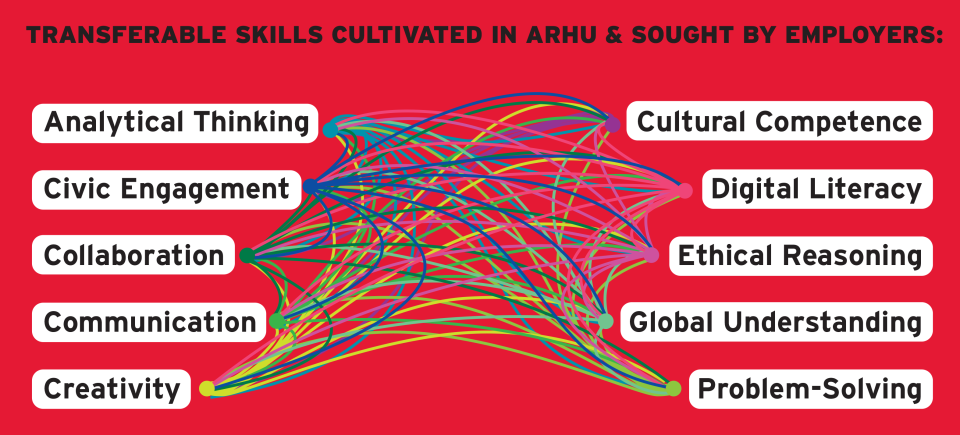Bachelor of Arts in Communication
Build communication expertise across contexts.
The Undergraduate Major in Communication
The Department of Communication offers students the option to pursue Communication Studies or select from one of the following specializations: Health and Science Communication, Media and Digital Communication, Political Communication and Public Advocacy or Public Relations. The course requirements for the different specializations vary and the key to a successful completion of the COMM major requirements is based on planning the appropriate course sequence for your specialization of choice. The major is composed of six parts: Foundations of Communication, Research Methods, Communication and Society (consists of 2 courses: Leadership and Social Change and Diversity and Inclusion), Theory and Principles, 2 Applied courses, and Electives.
A grade of 'C-' or better is required in all courses used to satisfy major requirements.
Degree Requirements
Requirements of the Major and Specializations for students admitted Fall 2020 and later
The communication major studies the history, processes, and effects of human communication.
Students may pursue a degree in general Communication Studies or in one of the specializations below.
ABOUT THE DEPARTMENT
The Department of Communication at the University of Maryland is dedicated to the pursuit of communication for the public good. Award-winning faculty are committed to training the next generation of communicators, leaders, researchers and educators while promoting a broad spectrum of voices and views. Research centers, for political communication and civic leadership, and health and risk communication, invite students to collaborate with faculty on innovative projects.
COURSEWORK
Communication coursework covers multiple levels of knowledge, including communication foundations, research methods and the major’s applications and relevance to society. The degree provides an understanding of practices necessary to be an effective communicator in a global world. Majors pursue a general communication studies path or select a specialization in health and science communication; media and digital communication; political communication and public advocacy; or public relations. Students may pursue the communication and information science double major offered in collaboration with the College of Information Studies for an increased focus on data analysis for informed decision making. Study abroad opportunities further expose students to global communication, and the university’s location near D.C. enables experiential learning through internships, networking and mentorships.
Career Readiness
The College of Arts and Humanities (ARHU) offers courses designed to ensure students are ready to enter the workforce, along with integrated and individualized academic and career advising. Alumni continue on to graduate school or forge their careers in a variety of industries and fields. The creative ways to apply your ARHU degree are truly limitless! Here are some placements specific to communication majors:
Internship Placements
- Allied Global Marketing
- Make-A-Wish Foundation
- Maryland General Assembly
- Washington Nationals
Graduate School Placements
- American University
- Georgetown University
- New York University
- Syracuse University
Employer Placements
- Booz Allen Hamilton
- Edelman
- iHeartMedia
- NBCUniversal
- U.S. Department of the Interior
Specialization Options
Health and Science Communication
Examines how health, risk, and science-related issues are communicated by individuals, groups, cultures, and media with particular attention given to effects of messages on public opinion and human behavior.
Course topics include:
- Health Communication Theory and Practice
- Health and Media Campaigns
- Risk Communication
- Crisis Communication
- Science Communication
Media and Digital Communication
Examines how messages are produced and disseminated to audiences by traditional media (i.e., television and newspapers) and emerging new digital media.
Course topics include:
- Media History and Criticism
- Black Discourse and Digital Society
- Technology and Digital Culture
- Media Effects
- Media Campaigns
- Digital Media and Message Production
- Digital Media and Advocacy
Political Communication and Public Advocacy
Examines how political messages are communicated in political settings including governmental institutions (international, national, state, and local levels) non-governmental organizations (NGOs and community groups), and activist groups (social movements).
Course topics include:
- Political Communication
- Politics, Media and Digital Culture
- Public Deliberation and Political Advocacy
- Protest Rhetoric
- Public Address and Historical Research
- Rhetoric of Black America
- Speech Writing
- Political Advertising
Public Relations
Examines how messages are strategically managed to build and maintain relationships with groups that enhance organizational success, shape public opinion, and promote corporate social responsibility.
Course topics include:
- Public Relations Management
- PR Writing and Editing
- PR Campaigns
- Public Relations Research
- Communication Ethics
- Corporate Social Responsibility
- New Media Engagement
Communication and Information Science Double Major
The Department of Communication and the College of Information Studies have worked together to create a plan for students who wish to double major in Communication and Information Science. This course of study gives students the technical and communication skills necessary to be successful in an increasingly data driven world. See below for the plan of study.
News View All News
Contact Us
BOLDLY HUMAN FEARLESSLY CREATIVE
ABOUT THE COLLEGE
When you join the University of Maryland College of Arts and Humanities (ARHU), you become part of a supportive and inclusive community committed to solving the world’s grand challenges. ARHU is reimagining an education in the arts and humanities by empowering students to make sense of the world using empathy, creativity and intellectual rigor. Our faculty and staff experts are focused on preparing competitive, versatile and visionary leaders equipped to address the complexities of the human experience. Graduates are purposefully prepared for successful careers and fulfilling lives.




